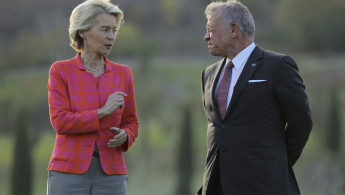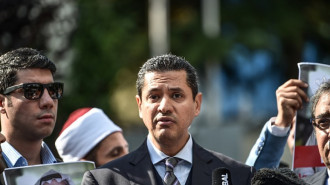Breadcrumb
Leaders of Jordan and southern Europe meet in a bid to help de-escalate Middle East crisis
The leaders of nine southern European Union countries and Jordan are meeting in Cyprus on Friday to come up with ways to de-escalate the crisis in the Middle East that is threatening to engulf Lebanon and trigger a wider humanitarian crisis.
Jordan’s King Abdullah will join the leaders of the so-called MED9 — including Italy, Spain, France, Greece, Cyprus, Malta, Slovenia, Portugal and Croatia — as well as European Commission President Ursula von der Leyen to brainstorm initiatives aimed at protecting Lebanese civilians caught in the crossfire between Israel and Hezbollah.
The leaders will also focus on helping clinch a ceasefire deal between Israeli forces and Hamas in the Gaza strip in line with a UN Security Council resolution adopted unanimously in June.
Cyprus’ government spokesman Konstantinos Letymbiotis said Thursday the Jordanian monarch’s presence at the meeting lends additional weight to the proceedings given his country’s role in helping peace efforts in the region.
The meeting comes amid reports of an international diplomatic effort to degrade Hezbollah's political hold in Lebanon.
“We want the Lebanese people to decide who their leaders ought to be, bottom line, and that has been our position," US State Department spokesman Matthew Miller said Wednesday.
"We certainly don’t want to dictate to the people of Lebanon who their leader is, and we’re not going to ... we want them to be able to do it absent a terrorist organization putting a gun to their head, which is the situation that Lebanon has been in for decades now.”
“Ultimately, we hope that Hezbollah is degraded enough that they are less of a force in Lebanese politics,” he added.
According to Letymbiotis, King Abdullah will also discuss with the leaders way of further bolstering his country’s relations with the EU.
The Jordanian monarch and Cypriot President Nikos Christodoulides will put forward a joint proposal to create a regional firefighting hub in Cyprus through the permanent deployment of fire-fighting aircraft on the island nation to respond to regional emergencies.
Christodoulides will also raise EU efforts to deal with migration flows through the adoption a new asylum policy that would more evenly share the distribution of asylum seekers through all EU members.
Cyprus is considered a front-line country that receives a significantly high numbers of asylum seekers relative to its population.
Climate change is also on the agenda as the east Mediterranean and the Middle East are considered particularly vulnerable areas to temperatures changes.
Christodoulides will also highlight Cyprus’ role in helping deliver humanitarian aid to civilians in Gaza via a maritime corridor as well as a waystation for the repatriation of third-country nationals evacuated from Lebanon.
According to Letymbiotis, more than 2,400 third-country nationals from 20 countries have so far used Cyprus as a transfer point to their homeland.






![Anthony Blinken speech [Getty] Anthony Blinken speech [Getty]](/sites/default/files/styles/image_684x385/public/media/images/6263436E-8ACD-4D3C-9055-25A7BE79DD5A.jpg?h=d1cb525d&itok=fLHmHCRG)
 Follow the Middle East's top stories in English at The New Arab on Google News
Follow the Middle East's top stories in English at The New Arab on Google News
![trump putin summit [getty] trump putin summit [getty]](/sites/default/files/styles/image_330x185/public/media/images/FC0BAC95-8593-4C01-91E0-A54F5BA9C681.jpg?h=d1cb525d&itok=VSb-ozsZ)

